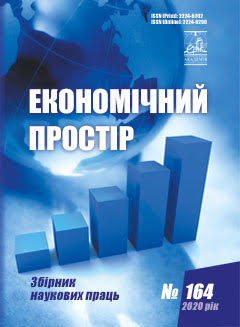MONETARY POLICY IN CRISIS
Abstract
The article is devoted to the study of conditions of application and influence of non-traditional monetary policy of central banks of developed countries on national economies and economies of emerging market countries. Based on critical analysis and systematization of basic research on the analysis of non-traditional monetary policy and its impact on the economies of different countries, it is substantiated that non-traditional monetary policy is a set of measures aimed at restoring the transmission mechanism and eliminating financial market imbalances. The main tools of non-traditional monetary policy are - previous management, quantitative easing; credit easing; negative interest rates, qualitative mitigation. Relevant areas of research on the financial performance of economies were also justified, as monetary policy directly affects interest rates, money supply, exchange rates, availability of credit, and through the financial sector to other sectors of the economy. During the aggravation of the economic and debt crisis, which had a negative impact on the Eurozone countries, investors' interest in CEE countries increased due to higher interest rates and the opportunity to make more profits. The study of the impact of the ECB's monetary policy on the financial indicators of Central and Eastern Europe revealed that the ECB's unconventional policy, including quantitative easing aimed at lowering long-term interest rates, affected the yield on government bonds of almost all EU countries, not only member states. euro area, which generally declined after 2014. Non-traditional monetary policy and an increase in the ECB's balance sheet also affect investment flows to CEE countries, but are mainly debt instruments in both direct and portfolio investment. The opposite situation is observed in the Eurozone countries with a high debt burden, especially in Greece and Italy. Despite the fact that the ECB's policy has led the euro area countries with a high level of debt to reduce the debt-to-GDP ratio, there is a tendency to increase the share of public debt payments to GDP. In this situation, the ECB simply cannot significantly change the purpose of its monetary policy, because any, even small, increase in the discount rate will lead to a new debt crisis in the Eurozone with its epicenter in Italy and Greece. The study of the impact of non-traditional policies of the Bank of Japan, the Fed and the ECB on the economy of Ukraine confirms the hypothesis that the actions of the ECB have the greatest impact on the financial performance of Ukraine. The analysis shows the impact of non-traditional monetary policy on the exchange rate of the Ukrainian hryvnia to the euro, US dollar and Japanese yen, but it was not significant. This is due to the fact that monetary policy in Ukraine only in 2015 actually moved from a fixed exchange rate to a floating exchange rate and began to apply inflation targeting. Announcements of non-traditional monetary policy have also affected government bond yields and stock indices, but the Ukrainian stock market is underdeveloped and has little effect. The main influence was the first programs of non-traditional monetary policy of the ECB, the USA and the Bank of Japan. In times when non-traditional measures were just being introduced and difficult to regulate and predict. Thus, it was proved that, on the one hand, unconventional monetary policy can stimulate economic growth, and on the other hand, create significant risks for further monetary policy opportunities to counter future crises.
References
Schenkelberg H., Watzka S. Real effects of quantitative easing at the zero lower bound – structural VAR-based evidence from Japan. Journal of International Money and Finance. 2019. № 33. P. 327–357.
Hayashi F., Koeda J. Exiting from QE. NBER Working Paper. 2020. № 19938. P. 1–22.
Abbassi P., Linzert T. The effectiveness of monetary policy in steering money market rates during the financial crisis. Journal of Macroeconomics. 2020. № 34. P. 945–954.
Gambetti L., Musso A. The macroeconomic impact of the ECB’s expanded asset purchase programme (APP). European Central Bank Working Paper. 2020. № 2075. P. 1–43.
Serra A.P., Ferreira E. ECB, BoE and Fed Monetary-Policy announcements: price and volume effects on European securities markets. Banco de Portugal, Economics and Research Department Working Papers. 2020. № 201914. P. 1–40.
Родіонова Т.А. Дохідність іноземних інвестицій у країнах із ринком, що формується : автореф. дис. Харків : Харківський національний університет імені В.Н. Каразіна. 2014. С. 1–23.
Yakubovskiy S., Rodionova T., Derkach T. Impact of foreign investment income on external positions of emerging markets economies. Journal Transition Studies Review. 2020. № 26(1). Р. 81–91.
Schenkelberg H. Watzka S. (2019). Real effects of quantitative easing at the zero lower bound – structural VAR-based evidence from Japan. Journal of International Money and Finance, no. 33, pp. 327–357.
Hayashi F. Koeda J. (2020). Exiting from QE. NBER Working Paper, no. 19938, pp. 1-22.
Abbassi P., Linzert T. (2020). The effectiveness of monetary policy in steering money market rates during the financial crisis. Journal of Macroeconomic, no. 34, pp. 945-954.
Gambetti L., Musso A. (2020). The macroeconomic impact of the ECB’s expanded asset purchase programme (APP). European Central Bank Working Paper, no. 2075, pp. 1-43.
Serra A.P., Ferreira E. (2020). ECB, BoE and Fed Monetary-Policy announcements: price and volume effects on European securities markets. Banco de Portugal, Economics and Research Department Working Papers, no. 201914, pp. 1-40.
Rodionova T.A. (2014). Dokhidnist inozemnykh investytsii v krainakh z rynkom, shcho formuietsia. Avtoreferat dysertatsii. [Return on foreign investment in emerging markets]. Kharkiv: Kharkivskyi natsionalnyi universytet imeni V.N. Karazina (in Ukrainian), pp. 1–23.
Yakubovskiy, S., Rodionova, T., Derkach, T. (2020). Impact of foreign investment income on external positions of emerging markets economies. Journal Transition Studies Review, no. 26 (1), pp. 81-91.



